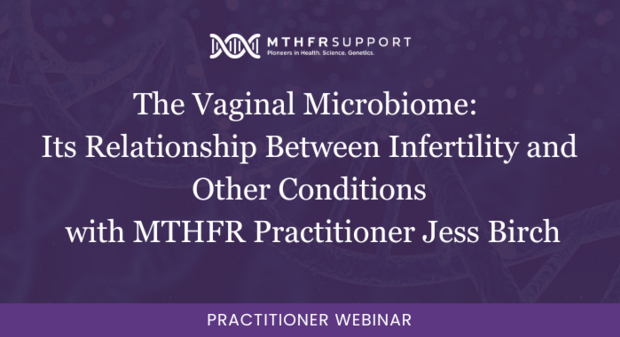The Vaginal Microbiome & Its Relationship Between Infertility and Other Conditions
with MTHFR Practitioner Jess Birch
The vaginal microbiome refers to the community of microorganisms that inhabit the vagina. These microorganisms include bacteria, viruses, and fungi. The composition of the vaginal microbiome can vary between individuals, and it is influenced by factors such as age, hormonal fluctuations, sexual activity, and overall health.
The dominant bacteria in a healthy vaginal microbiome are typically lactic acid-producing bacteria, mainly species of Lactobacillus. These bacteria play a crucial role in maintaining the acidic pH of the vagina, which is essential for preventing the overgrowth of harmful bacteria and maintaining a healthy environment.
In this webinar we will cover:
- Protective Role: The Lactobacillus species in the vagina produce lactic acid, creating an acidic environment that helps to prevent the growth of pathogenic bacteria. This protective role is crucial in preventing infections, such as bacterial vaginosis and yeast infections.
- Influence on Fertility: A balanced and healthy vaginal microbiome may contribute to fertility by creating an environment conducive to the survival and function of sperm. Disruptions in the microbiome, such as bacterial vaginosis, have been associated with an increased risk of infertility.
- Pregnancy and Birth: The vaginal microbiome can influence pregnancy and childbirth. During childbirth, the baby comes into contact with the mother's vaginal microbiota, and this exposure is thought to influence the development of the infant's own microbiome. A healthy maternal microbiome is associated with a lower risk of certain complications, such as preterm birth.
- Impact on Reproductive Health: Imbalances in the vaginal microbiome have been linked to various reproductive health issues, including infertility, preterm birth, and an increased risk of sexually transmitted infections.
- Hormonal Influences: Hormonal changes, such as those associated with the menstrual cycle, pregnancy, and menopause, can impact the composition of the vaginal microbiome. For example, the levels of estrogen influence the abundance of Lactobacillus in the vagina.
- Factors Affecting the Vaginal Microbiome: Various factors can influence the composition of the vaginal microbiome, including antibiotic use, sexual activity, douching, and certain lifestyle factors. These can disrupt the balance of bacteria and increase the risk of infections.
GET INSTANT ACCESS TO THE RECORDING

